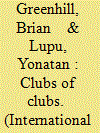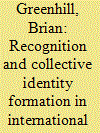|
|
|
Sort Order |
|
|
|
Items / Page
|
|
|
|
|
|
|
| Srl | Item |
| 1 |
ID:
153924


|
|
|
|
|
| Summary/Abstract |
Has international cooperation become fragmented in recent decades? We focus on a specific form of potential fragmentation in the international system: the extent to which the network of intergovernmental organizations (IGOs) consists of distinct clusters of closely cooperating states. IR scholars—including those with an interest in the causes and consequences of membership in IGOs—pay relatively little attention to the structure of the larger IGO network. At the same time, scholars concerned with fragmentation often assume that it has increased without clear measures of this phenomenon. We use the network analytic technique of modularity maximization to show that throughout the post–World War II period, the structure of the IGO network can generally be divided into distinct groups of states on the basis of their shared IGO memberships. Yet we also show that temporal trends indicate that the IGO network has become less fragmented in recent decades, suggesting that cooperation via these organizations has become more global and less regional. Our findings indicate that, at least as far as cooperation through formal organizations is concerned, fragmentation has decreased in recent decades.
|
|
|
|
|
|
|
|
|
|
|
|
|
|
|
|
| 2 |
ID:
095378


|
|
|
|
|
| Publication |
2010.
|
| Summary/Abstract |
Does membership in Intergovernmental Organizations (IGOs) affect states' human rights behavior? One might expect IGOs with a specific human rights mandate, like the International Labour Organization or the Council of Europe, to have a positive effect on the human rights practices of their member states. But what about other sorts of IGOs, particularly those with no direct connection to human rights issues? This study employs cross-national data on abuses of "physical integrity rights" for 137 countries over the period 1982-2000 to test the hypothesis that IGOs can promote the diffusion of human rights norms by providing venues for interstate socialization. Recent empirical work on IGOs has suggested that this sort of socialization effect can play an important role in promoting democracy and can also lead to a more general convergence among states' interests. The results presented here suggest that IGOs can have a surprisingly powerful influence on states' human rights practices as a result of this process.
|
|
|
|
|
|
|
|
|
|
|
|
|
|
|
|
| 3 |
ID:
135898


|
|
|
|
|
| Summary/Abstract |
What explains the large variation in the time taken by states to ratify the 1948 Genocide Convention? The costs of ratification would appear to be relatively low, yet many states have waited several decades before ratifying this symbolically important treaty. This study employs a “nested analysis” that combines a large-n event history analysis with a detailed study of an important outlying case in order to explain the main sources of this variation. Surprisingly, the results of our event history analysis suggest that states do not become more likely to ratify once the treaty has become widely adopted by others. We use the case of Japan to examine this relationship in more detail. We argue that once the norm embodied in a human rights treaty develops a “taken-for-granted” character, the rate of ratification can slow down because the marginal costs of additional ratifications begin to outweigh the expected benefits
|
|
|
|
|
|
|
|
|
|
|
|
|
|
|
|
| 4 |
ID:
156662


|
|
|
|
|
| Summary/Abstract |
Existing work has shown that membership in intergovernmental organizations (IGOs) can, among other outcomes, reduce conflict, promote democratization, and shape crisis bargaining. The traditional approach to studying how IGOs can reduce conflict has focused on the effects of dyads’ direct ties to IGOs. In doing so, these analyses use fairly simple counts of the number of IGOs to which the states in each dyad share membership. We argue that this approach is too narrow; we instead consider the effects of higher-order groupings within the IGO network, which we call IGO clusters. Within these IGO clusters, states share relatively many IGO connections with each other, both directly and through indirect links through third parties, fourth parties, and so on. The effects of indirect IGO ties are especially important within such structures. We use a modularity maximization approach to detect clusters within the IGO network. We find robust empirical support for our hypothesis that the pacifying effect of IGO membership stems from the extent to which pairs of states are more deeply embedded within the wider IGO network. Indeed, we find that once we account for states’ shared membership in clusters of IGOs, the simpler dyadic measure of shared IGO membership no longer shows evidence of a conflict-inhibiting effect.
|
|
|
|
|
|
|
|
|
|
|
|
|
|
|
|
| 5 |
ID:
082706


|
|
|
|
|
| Publication |
2008.
|
| Summary/Abstract |
Applying the model of `recognition politics' to international relations can help to explain the identity-based elements of international conflicts that rationalist models leave out. This article uses psychological theories of identity formation to critically assess the recent move by constructivist scholars (most notably Alexander Wendt) to bring the Hegelian idea of the `struggle for recognition' into the study of IR. Examining recognition theory in this way shows that while the insights of `identity theory' developed in the symbolic interactionist tradition lend support to the idea that recognition of the `other' is essential to constituting the identity of the `self', much of the experimental work carried out within Social Identity Theory and its related fields fails to support the claim that recognition leads to the formation of an over-arching collective identity. Without a credible mechanism for collective identity formation, recognition theory fails to predict fundamental change in the international system.
|
|
|
|
|
|
|
|
|
|
|
|
|
|
|
|
| 6 |
ID:
093226


|
|
|
|
|
| Publication |
2009.
|
| Summary/Abstract |
This article investigates the nature of the linkages between trade and labor rights in developing countries. Specifically, we hypothesize that a "California effect" serves to transmit superior labor standards from importing to exporting countries, in a manner similar to the transmission of environmental standards. We maintain that, all else being equal, the labor standards of a given country are influenced not by its overall level of trade openness, but by the labor standards of its trading partners. We evaluate our hypothesis using a panel of 90 developing countries over the period 1986-2002, and we separately examine the extent to which the labor laws and the actual labor practices of the countries are influenced by those of their export destinations. We find that strong legal protections of collective labor rights in a country's export destinations are associated with more stringent labor laws in the exporting country. This California effect finding is, however, weaker in the context of labor rights practices, highlighting the importance of distinguishing between formal legislation and actual implementation of labor rights.
|
|
|
|
|
|
|
|
|
|
|
|
|
|
|
|
|
|
|
|
|